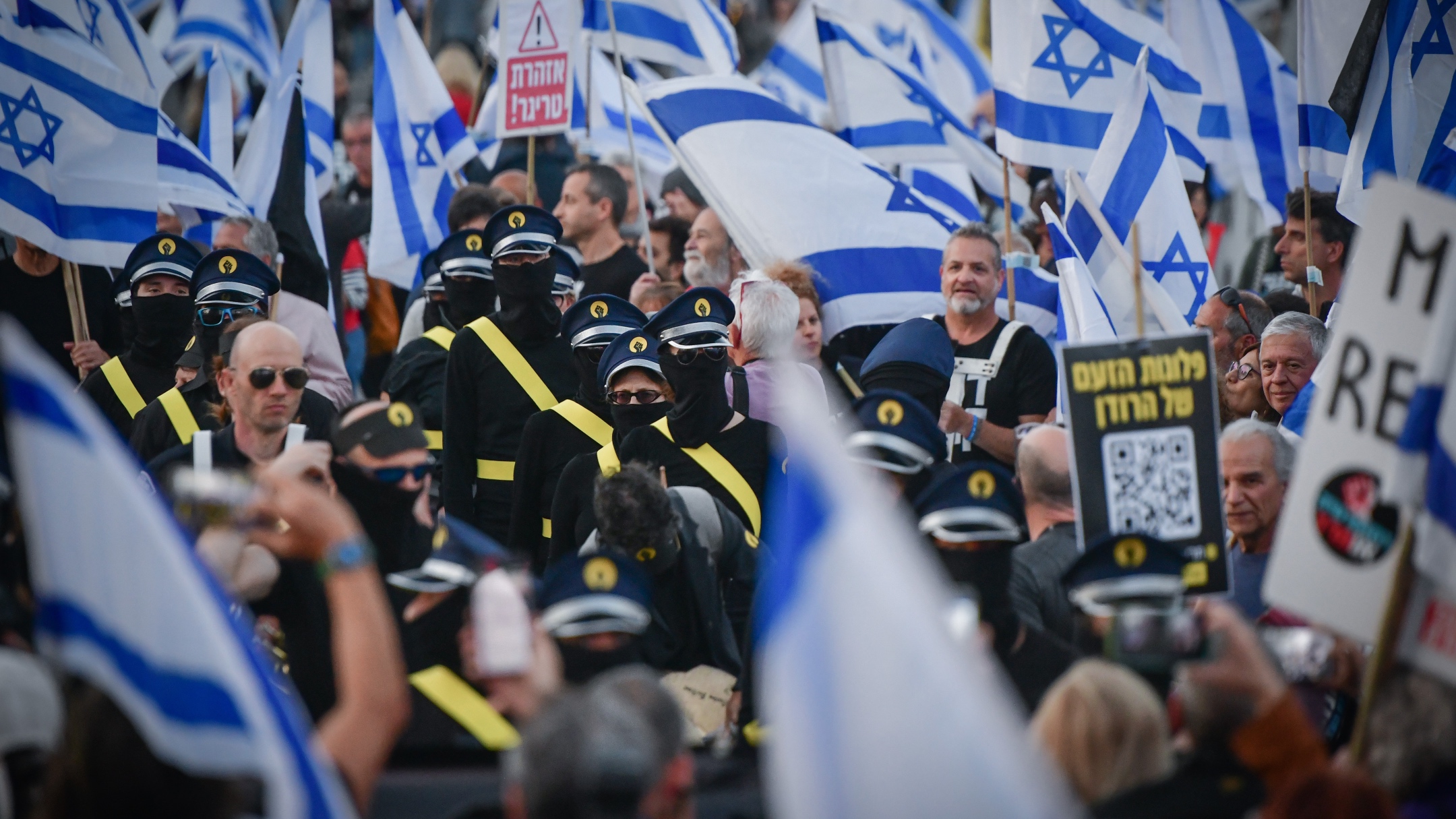(JTA) – Like many synagogues have done over time, Congregation Kol Ami in Seattle is partnering with local Israelis to celebrate Israel’s birthday — a big one this year.
But Kol Ami won’t be holding a straightforward celebration for Israel’s 75th. Instead, it’s working with UnXeptable, a group of expat Israeli activists who have been protesting for months against the Israeli government’s plan to overhaul the country’s judiciary, for what they are calling a “family gathering honoring Israel’s democracy.” There, congregants will study Israel’s Declaration of Independence then sign a new copy to “rededicate” it.
“Most cities are just going to do a pareve 75th anniversary of Israel and not recognize the emotional reality of a lot of Israelis right now,” said Rabbi Yohanna Kinberg, using the Jewish term for food that contains neither meat nor dairy — in other words, a safe option.
“We have all these people in our communities who are worried about their friends and family, and we’re just going to be folk dancing and eating falafel?” she asked.
Such is the dynamic at play as Israel celebrates a milestone birthday under the shadow of political and cultural turmoil that people on both sides of the judicial reform fight say could change the country’s character forever — and that has altered the relationship between American Jews and Israel.
Long hesitant to weigh in on Israel’s domestic affairs, many American Jewish groups and leaders, including rabbis, spent the past several months openly criticizing the country’s right-wing government for its effort to sap the power of the Israeli Supreme Court.
Now, with the judicial legislation on pause, many of those groups have turned their attention to Yom Haatzmaut, this year celebrated starting the evening of April 25, and the 75th secular anniversary of Israel’s independence on May 14. Jewish Federations of North America is supporting its 146 local federations in convening “Israel @ 75” programming, while synagogues of all denominations have planned an array of parties, study sessions and special events.
People gather to watch performers from the Independent Women Dance Troupe during celebrations marking Israel’s 73rd Yom Haatzmaut (Independence Day) in New York City’s Times Square, April 18, 2021.(Alexi Rosenfeld/Getty Images)
The question facing all of them: With even Israel’s president warning of possible political violence, just how festive can this year’s birthday feel?
For Kinberg, the answer is clear: An uncomplicated party would be “sort of like celebrating the Fourth of July if we’re in the middle of a civil war.”
American Independence Day offers an instructive example for Rabbi Erez Sherman of Sinai Temple in Los Angeles, too — but he has come to a different conclusion from Kinberg. He said his community celebrates Yom Haatzmaut the way most Americans mark the Fourth of July — without tailoring it to the current political headwinds.
“Are we going to spend it pointing at every challenge that Congress has?” he asked. “Or are we going to say, ‘This country is unique’?”
Temple Sinai is partnering with several local Jewish organizations, including the Jewish Federation of Greater Los Angeles, Pico Union Project and the Jewish Journal, for its weeks-long series of “Israel @ 75” events. Another sponsor is StandWithUs, a pro-Israel advocacy group that is involved in Israel-at-75 celebrations in several cities.
Together, the consortium will host concerts, history lectures, art exhibits and special Shabbat services — and even if the complicated present is expected to come up, it won’t be a focus.
“While we can understand challenges, there is also time for celebrations and birthdays,” said Sherman, who oversees Israel programming at his synagogue. “Israel is not perfect, but a world without Israel would be a lot less perfect than it is now.”

Thousands of Israelis protest against the planned judicial overhaul at the Azrieli junction in Tel Aviv, April 15, 2023. (Avshalom Sassoni/Flash90)
The balancing act has hit home this week for the umbrella group for North America’s Jewish federations, which is holding its annual convention in Israel next week — a plan that was set even before Prime Minister Benjamin Netanyahu was reelected and formed his right-wing government last fall. UnXeptable called for the group not to feature Netanyahu, who has sworn to restart his push to pass the judicial reform measures. But Jewish Federations of North America rejected the call on Monday, saying that “the opportunity to hear from Israel’s duly elected president and prime minister is a symbol of Israel’s achievement.”
What’s clear is that American Jews interested in engaging with Israel on its 75th birthday will have no shortage of options, from food festivals, children’s carnivals and concerts to headier fare. Experts on Israel are in high demand, with packed schedules of live and Zoom events offering up seemingly unending choices for people with all levels of familiarity with Israel’s history and politics.
For some American Jewish leaders, some of whom have expressed concern about Israel engagement in their communities, the very density and diversity of the offerings is itself a win.
“That’s great that we are in a Jewish community that has so many different forms of expression,” said Rachel Jacoby Rosenfield, executive vice president of the Shalom Hartman Institute of North America, a think tank that is organizing its own series of Israel-at-75 events that begins with a talk at New York City’s Central Synagogue titled “Dispatches from an Anxious Nation.”
For some Jewish communal organizers, celebrating Israel and discussing its future as a democracy go hand in hand, a dynamic eased by the landmark year and its invitation to hold multiple events.
In Cleveland, for example, the Jewish federation is mounting an “Israel Fest” headlined by a concert from the Shalva Band, a group of musicians with disabilities who appeared on an Israeli talent show. But the community is also hosting Israeli journalist Matti Friedman, who has been critical of the judicial reforms, as a guest speaker.
The federation is offering small grants to any Jewish Clevelanders looking to host their own Israel at 75 events, too, and is placing very few stipulations on their content.
If grantees want to use the opportunity to talk about the fight for Israel’s democracy or even debate matters related to Israel’s occupation of the West Bank, they can, said Ilanit Gerblich Kalir, assistant vice president of external affairs at the federation. If they just want to host “blue-and-white-themed parties,” she said, they can do that too.
“We have to celebrate what we’re proud of Israel for. There’s a lot to be proud of,” Kalir said. “But at the same time, part of connecting with Israel and part of what’s going on is affected by this country right now.”




